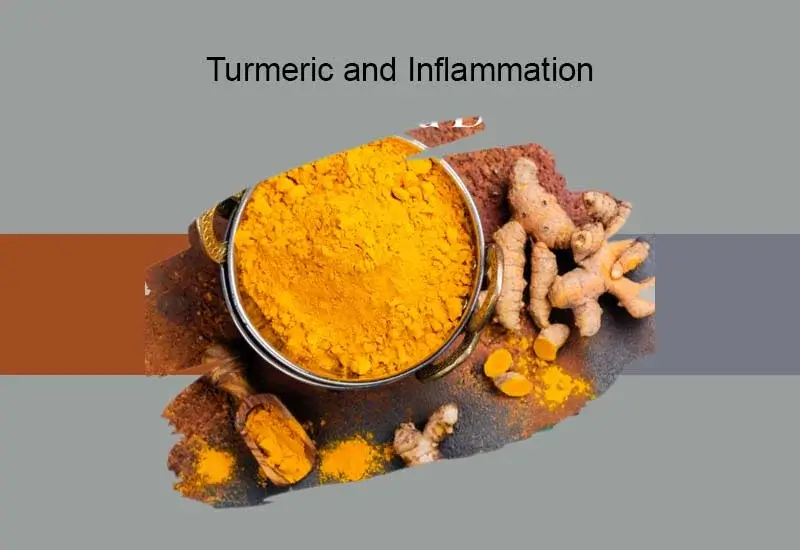Turmeric and Inflammation: What You Need to Know!
Turmeric, a vibrant yellow spice commonly used in Indian and Asian cuisines, has gained popularity for its potential health benefits, particularly its anti-inflammatory properties. Inflammation is the body’s natural response to injury or infection, but chronic inflammation can lead to various health issues.
Understanding Inflammation
Inflammation is crucial to the body’s immune response, protecting us from harmful substances and facilitating healing. When the body encounters an injury or infection, immune cells release chemicals that cause blood vessels to widen, leading to redness and swelling. This process helps isolate and remove harmful agents.
Acute VS Chronic Inflammation
Acute inflammation is a short-term response, typically lasting a few days, and is part of the body’s natural healing process. However, if the inflammatory response persists for an extended period, it can become chronic inflammation. Chronic inflammation can be harmful and is linked to various health conditions, such as arthritis, heart disease, diabetes, and cancer.
The Role of Curcumin in Turmeric
The main active compound in turmeric responsible for its potential health benefits is curcumin. Curcumin is a powerful antioxidant and exhibits anti-inflammatory properties, making it a subject of extensive research in the medical and nutritional fields.
Curcumin’s Anti-Inflammatory Effects
Curcumin is believed to inhibit molecules involved in the inflammatory process, thus reducing inflammation in the body. It targets various pathways that play a role in chronic inflammation, helping to alleviate symptoms and potentially contributing to better overall health.
Health Benefits of Turmeric and Curcumin
Arthritis Relief: Several studies have suggested that curcumin may help reduce symptoms of arthritis, such as joint pain and stiffness, due to its anti-inflammatory properties.
Heart Health: Chronic inflammation is a risk factor for heart disease. Curcumin may benefit heart health by reducing inflammation and improving blood vessel function.
Digestive Health: Curcumin’s anti-inflammatory effects may benefit digestive health by soothing irritation and promoting gut health.
Brain Health: Some research suggests that curcumin may have neuroprotective properties, potentially benefiting brain health and cognitive function.
Antioxidant Activity: Curcumin’s antioxidant properties help neutralize free radicals, reducing oxidative stress and supporting overall well-being.
Incorporating Turmeric into Your Diet
To fully harness the potential benefits of turmeric and curcumin, consider the following tips for incorporating it into your diet:
Turmeric in Cooking: Add turmeric to soups, stews, curries, and rice dishes for flavor and color.
Golden Milk: Prepare a soothing and nutritious golden milk by mixing turmeric with milk or a dairy-free alternative, adding a dash of black pepper to enhance curcumin absorption.
Turmeric Tea: Brew a comforting cup of turmeric tea by steeping grated or powdered turmeric in hot water.
Turmeric Supplements: If it’s challenging to consume turmeric regularly through food, consider turmeric supplements standardized for curcumin content.
Precautions and Considerations
While turmeric and curcumin have shown promising health benefits, it’s essential to exercise caution and consider the following:
Bioavailability: Curcumin’s bioavailability can be limited, meaning the body may not absorb it effectively. Combining turmeric with black pepper or consuming it with healthy fats may improve absorption.
Medication Interactions: Consult your healthcare provider before taking turmeric supplements, as they may interact with certain medications.
Allergies and Sensitivities: Some individuals may be allergic to turmeric or experience gastrointestinal discomfort. Start with small amounts to gauge your tolerance.
Conclusion
Turmeric’s potential anti-inflammatory effects, attributed to its active compound curcumin, have captured the interest of researchers and health enthusiasts alike. Incorporating turmeric into your diet may offer various health benefits, supporting joint health, heart health, digestion, and overall well-being. However, it’s essential to use turmeric as part of a balanced diet and consult a healthcare professional if you have specific health concerns or are considering turmeric supplements. By embracing the potential benefits of turmeric and curcumin, you can take a proactive step towards promoting a healthier and more vibrant life.







